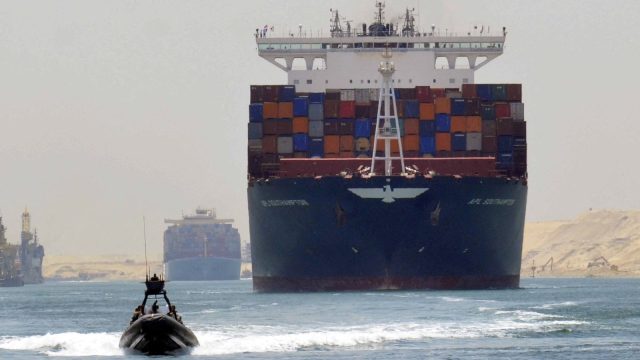Freight travelling through the Suez Canal has almost halved since Yemen’s Houthi rebels began attacking cargo ships in the Red Sea.
The key shipping lane links producers in the Asia-Pacific region and Western markets – and longer, alternative routes has caused delays and increased costs.
In response to the attacks by the Iranian-backed militant group, which it says are in support of Palestinians in Gaza, the United States and Britain have carried out airstrikes.
Follow Middle East latest: ICJ rules Israel will face genocide investigation
UNCTAD (United Nations Conference on Trade and Development), which supports developing countries in global trade, said the number of ships using the canal over the last two months had fallen by 39%, leading to a 45% decline in freight tonnage.
Jan Hoffmann, the agency’s head of trade logistics, said there were now three key global trade routes disrupted, following Russia’s invasion of Ukraine and the Panama Canal, where low water levels from drought meant shipping last month was down 36% year-on-year and 62% from two years ago.
He said: “We are very concerned. We are seeing delays, higher costs, higher greenhouse gas emissions.”
Pollution was rising, he said, because ships were opting for longer routes and also travelling faster to compensate for detours.
The Suez Canal handles 12-15% of global trade and 25-30% of container traffic.
Container shipments through the canal were down 82% in the week to 19 January from early December.
Spot container rates recorded their sharpest weekly increase of $500 (£392), affecting not just Asia-to-Europe shipments but also the non-Suez route to the US west coast.
Read more:
World court stops short of ordering ceasefire in Gaza
Who are the Houthis?
However, rates were still only about half of the peak hit during the COVID-19 pandemic.
Mr Hoffmann said food prices could feel the impact, adding about half of the increases seen since the war in Ukraine were due to higher transport costs, although consumers in developed countries may take some time to see an effect.
He said: “Passing on these higher freight rates to consumers takes time, up to a year until… we would really see them in the shop, whatever shop – Ikea, Walmart or something.”















